Waterloo, Ontario, Canada.
This entire site is a private effort of free information.
There are no cookies or adverts, and nothing for sale.
Alert! All content is moving here: https://neilrieck.net/
A special message for Christmas 1999
- Quote: “The thing the ecologically illiterate don't realise about an ecosystem is
that it's a system. A system! A system maintains a certain fluid stability that can be destroyed by a misstep in just one
niche. A system has order, flowing from point to point. If something dams that flow, order collapses. The untrained might
miss that collapse until it was too late. That's why the highest function of ecology is the understanding of
consequences.”
Frank Herbert (author of Dune)
- Food for thought:
Title: "Why Democracy Is Mathematically Impossible"
Video: https://www.youtube.com/watch?v=qf7ws2DF-zk
Better Title: "First-past-the-post is bad, ranked ballots are better, rated ballots are best"
Comment: At time mark 5:20 we learn that ranked ballots cause candidates to be more civilized (nicer to each other, and nicer to you) BECAUSE they want you to consider them as choices for primary, secondary and tertiary slots. This seems to infer that that first-past-the-post is the main reason why many politicians only speak to their base. - In this archival interview from October 9, 1992, Carl Sagan and Ann Druyan talk
about their book Shadows
of Forgotten Ancestors: A Search for Who We Are, an investigation of our human origins. Sagan and Druyan discussed
human prejudice and distrust of other cultures in the context of the Cold War and the presidential election of 1992. But
many of the conversation’s themes about fear and xenophobia seem just as applicable today (2024).
https://www.sciencefriday.com/segments/two-cosmic-explorers-investigate-the-world-within-us/ - A few thoughts on our economy from Professor of Economics, Richard Wolff
short video (10:13): https://rumble.com/v5ffa3w-richard-wolff-this-is-the-end-of-the-u.s.-empire.html
long video (1:26:12) https://rumble.com/v5eet3p-live-richard-wolff-joins-the-show-nuland-admits-us-stopped-peace.html
hint: Click on the link, watch two short adverts, the video will then begin. Now drag the time-slider to the 35 minute mark
excerpt: The USA is a debtor nation (citizens as well as corporations). The annual US economy is ~ $23 trillion while the national debt is ~ $35 trillion (a debt-to-GDP ratio of 1.52 which should never be above 1.00). Read my critique of Wolff's 2024 book: Understanding Capitalism - Once upon a time, General Motors developed an experimental electric automobile known as the General Motors EV1. Only 1,117 were manufactured between 1996 and 1999, but they were only available to lease, not to purchase. A few years later, nearly all were recalled by GM then crushed (not certain about that business decision here since people demanded to buy them, but GM said no.) GM went on to make a ton of money selling gas guzzler Trucks, Hummers, and SUVs. Meanwhile, GM's partners at the time (Toyota, Nissan and Honda) continued development of both electric and hybrid technologies. It now appears that BYD (China - 2003) and Tesla (USA - 2008) were both created in response to GM's cancellation of the EV1. It is difficult to feel remorse for GM's loss of market-share which was totally caused by their short-sighted business decisions. Perhaps GM execs should be forced to read Aesop's Fable titled The Tortoise and the Hare (where sleep would be replaced with hubris).
- CO2 still rising: Facts: Carbon dioxide in the atmosphere warms the planet,
causing climate change. Human activities have raised the atmosphere’s carbon dioxide content by 50% in less than 200
years.
https://climate.nasa.gov/vital-signs/carbon-dioxide/
Note: the 2024 summer peak hit 426.91 ppm. The 2024 peak hit at least 429 ppm. - Debunking a climate denier's video:
Titled: All the errors and fakery from “Climate: The Movie (The Cold Truth)” that I can fit in.
https://www.youtube.com/watch?v=HhAX42dT09w - The math behind weather predication and climate models. At Science Friday
Live in Boulder, Colorado, Ira sat down with two NCAR scientists, Dr. Yaga Richter and Dr. Jerry Meehl about their
work in this field.
program-page: https://www.sciencefriday.com/segments/weather-predictions-in-advance-earth-system-predictions/
audio-only: https://scifri-segments.s3.amazonaws.com/scifri202408094.mp3
excerpt: Well, when you talk about Earth system prediction, you have to go back to the 1980s, really. And that’s when we started using these, what we call Earth system models, or climate models. And in the ’80s, we had components of atmosphere, ocean, land, and sea ice. And these were basically computer programs that would communicate with each other. And these computer programs are sets of equations from physics, and thermodynamics, and fluid dynamics. And for those of you who were forced to take calculus, the core equations in these models are partial differential equations. So you can numerically and mathematically integrate them forward in time. So that’s how we make predictions with equations. And I still can’t believe it works, but it does actually work. (read: the full transcript) - Every curious person would most likely enjoy this 2020 lecture by James Burke
titled "Internet Knowledge"
https://www.youtube.com/watch?v=gvIy52kX-uU
comment: I suspect he is excluding social media :-) - Nerd Alert: watch this video interview between Micheal Shermer and Lisa Kaltenegger.
As founding director of Cornell University’s Carl Sagan Institute, astrophysicist Lisa Kaltenegger has built a team of tenacious scientists from many disciplines to create a specialized toolkit to find life on faraway worlds. In Alien Earths, she demonstrates how we can use our home world as a Rosetta Stone, creatively analyzing Earth’s history and its astonishing biosphere to inform this search. With infectious enthusiasm, she takes us on an eye-opening journey to the most unusual exoplanets that have shaken our worldview – planets covered in oceans of lava, lonely wanderers lost in space, and others with more than one sun in their sky! And the best contenders for Alien Earths. We also see the imagined worlds of science fiction and how close they come to reality.
- UK economy and 2024 election: Back in 2005, I read the book European Dream
by Jeremy Rifkin where the author compared the state economies of the United States of America (sorted by GDP) with the
countries of Europe (treating it as if it were the United States of Europe). In this 2005 chart we see that the GDP of Britain exceeded the GDP of the most prosperous state,
California.
Nineteen years later, Fareed Zakaria said this (starts at the 45 second mark of the CNN program, GPS (2024-06-12): When the British left the European Union they fantasized about forging a closer relationship with the United States almost becoming the 51st state. Were that to happen, it is surely sobering to Britain to realize that it would be the poorest state in the union where the per-capita GDP is below that of Mississippi. - Election influence vs. interference: A lot of political types are confusing "election
influence" with "election interference" so here are two definitions for your consideration: When anyone
suggests you vote for a certain person or party, then that is "election influence" (and all my cousins would also be
guilty). If anyone physically prevents you from voting, then that is "election interference". Note that both Canada and
Britain are not without some guilt in this area:
1) in 2016, a Canadian company named AggregateIQ was hired by British conservatives to influence the vote on BREXIT. Note that not everyone needs to be influenced, just a minor number of people in the middle to flip the decision.
2) in 2016, a British company named Cambridge Analytica was hired by American conservatives to influence the American Presidential election.
Note that not everyone needs to be influenced, just a minor number of people in the middle to flip the decision. This is a major weakness of first-past-the-post. - 2023 was the warmest summer since Jesus:
The broiling summer of 2023 was the hottest in the Northern Hemisphere in more than 2,000 years, a new study found. When the temperatures spiked last year, numerous weather agencies said it was the hottest month, summer and year on record. But those records only go back to 1850 at best because it’s based on thermometers. Now scientists can go back to the modern western calendar’s year 1, when the Bible says Jesus of Nazareth walked the Earth, but have found no hotter northern summer than last year’s. A study Tuesday in the journal Nature uses a well-established method and record of more than 10,000 tree rings to calculate summertime temperatures for each year since the year 1. No year came even close to last summer’s high heat, said lead author Jan Esper, a climate geographer at the Gutenberg Research College in Germany. Before humans started pumping heat-trapping gases into the atmosphere by burning coal, oil and natural gas, the hottest year was the year 246, Esper said. That was the beginning of the medieval period of history, when Roman Emperor Philip the Arab fought Germans along the Danube River. Esper’s paper showed that in the Northern Hemisphere, the summer of 2023 was as much as 2.1 degrees Fahrenheit (1.2 degrees Celsius) warmer than the summer of 246. In fact 25 of the last 28 years have been hotter than that early medieval summer, said study co-author Max Torbenson. The broiling summer of 2023 was the hottest in the Northern Hemisphere in more than 2,000 years, a new study found. When the temperatures spiked last year, numerous weather agencies said it was the hottest month, summer and year on record. But those records only go back to 1850 at best because it’s based on thermometers. Now scientists can go back to the modern western calendar’s year 1, when the Bible says Jesus of Nazareth walked the Earth, but have found no hotter northern summer than last year’s. A study Tuesday in the journal Nature uses a well-established method and record of more than 10,000 tree rings to calculate summertime temperatures for each year since the year 1. No year came even close to last summer’s high heat, said lead author Jan Esper, a climate geographer at the Gutenberg Research College in Germany. Before humans started pumping heat-trapping gases into the atmosphere by burning coal, oil and natural gas, the hottest year was the year 246, Esper said. That was the beginning of the medieval period of history, when Roman Emperor Philip the Arab fought Germans along the Danube River. Esper’s paper showed that in the Northern Hemisphere, the summer of 2023 was as much as 2.1 degrees Fahrenheit (1.2 degrees Celsius) warmer than the summer of 246. In fact 25 of the last 28 years have been hotter than that early medieval summer, said study co-author Max Torbenson. “That gives us a good idea of how extreme 2023 is,” Esper told The Associated Press. The team used thousands of trees in 15 different sites in the Northern Hemisphere, north of the tropics, where there was enough data to get a good figure going back to year 1, Esper said. There was not quite enough tree data in the Southern Hemisphere to publish, but the sparse data showed something similar, he said. Scientists look at the rings of annual tree growth and “we can match them almost like a puzzle back in time so we can assign annual dates to every ring,” Torbenson said. (link to article)
Seth Borenstein. The Associated Press. 2024-05-14 - Something to ponder on Earth
Day 2024
- A little video introduction to Rachel Carson and the origin of Scientific Environmentalism.
- Here is a second video about Rachel Carson.
- You may also enjoy listening to this Marvin Gay remake of "What's Going On" titled Mercy Mercy Me (the ecology)
- Did you know that the first Earth Day was in 1970? No? Then listen to this.
- In 1755, an earthquake struck Lisbon, Portugal, on November 1 (all saints day).
Most of the Christian community were inside cathedrals at the time, so many were killed (those not inside were spared). To
make matters worse, the resulting tsunami killed even more (death and destruction was limited to ocean-side cities). It is
thought that the total death toll exceeded 30,000 people. European philosophers of the time, including Voltaire, wondered why the Christian god didn't delay the quake until the day after. This
philosophical thought contributed to both The
Enlightenment and Deism
- https://en.wikipedia.org/wiki/1755_Lisbon_earthquake
- https://theconversation.com/is-god-good-in-the-shadow-of-mass-disaster-great-minds-have-argued-the-toss-137078
- https://blogs.scientificamerican.com/history-of-geology/november-1-1755-the-earthquake-of-lisbon-wraith-of-god-or-natural-disaster/
- The Enlightenment: Crash Course European History #18
- an hour with Neil deGrasse Tyson: https://www.youtube.com/watch?v=ANZTjzcaoVc
- Hollywood Exiles (a pod cast) describes the long history of how the American
government started (in 1920) a culture war with the Hollywood entertainment industry. Most North Americans know very
little about this topic.
- CBC Site: Hollywood Exiles
- BBC Site: Hollywood Exiles
- YouTube Site (BBC + CBC): Hollywood Exiles
comments:- Many Americans back then (and many today) confuse communism with socialism. I do not think any of these Americans were advocating collectivism. I thought the same while reading a biography of J Robert Oppenheimer last year.
- Most Americans believe they are totally free to believe what they believe, then associate with whomever they choose. The actions of the American government prove that they are not allowed to hold a contrary position, even if is it considered wrong by many.
- Why stupidity is an existential threat:
quote: It may sound like an insensitive statement, but the cold hard truth is that there are a lot of stupid people in the world, and their stupidity presents a constant danger to others. Some of these people are in positions of power, and some of them have been elected to run our country. A far greater number of them do not have positions of power, but they still have the power to vote, and the power to spread their ideas. We may have heard of “collective intelligence,” but there is also “collective stupidity,” and it is a force with equal influence on the world. It would not be a stretch to say that at this point in time, stupidity presents an existential threat to America because, in some circles, it is being celebrated. Read full article here1, here2, or here3 - Sea level rate-of-rise continues:
quote: Global mean sea level (GMSL) continued to rise in 2022, reaching a new record high for the satellite altimeter record (1993-2022). The rate of global mean sea level rise has doubled between the first decade of the satellite record (1993-2002: 2.27 mm/yr) and the last (2013-2022: 4.62 mm/yr). Read the full article here
comments:- using tide-gauge measurements by the British navy (starting in the 1600s), we know that average sea level rose 20-cm (8-inches) between 1890 and 1990
- we now know that the recent rate of sea level rise measurements from satellites represents a tripling compared to the average from 1901-1971. References: here1 and here2
- the second average above would result in 46 cm per century (or 18 inches), and the rate is still increasing. The problems of Venice Italy today could be a foretelling of the problems of American ports tomorrow.
- An existential crisis for human biology after 2040:
quote: In 1974, two American doctors published a report showing that human sperm counts had dropped more than 50% between 1951 and 1971. A meta-analysis published in 2017, based upon data from 185 studies of more than 42,000 men between 1973 and 2011, showed that sperm health seemed to be falling at a rate of around 1.5 per cent per year on average, and that this could represent an existential reproduction crisis for humanity after 2040. Continuing reading: newscientist.com
comments:- This does not mean that human reproduction will end after 2040, but it might mean the end of natural reproduction. One immediately thinks of the back stories behind Brave New World or The Handmaids' Tale
- Since the article also mentions similar drops in animals (dogs) I am tempted to think this continual drop since 1950 might be due to environmental pollution. One immediately thinks of the 1968 novel Do Androids Dream of Electric Sheep? (which was the basis for the Blade Runner movie). BTW, the book was released six years after Rachel Carson published Silent Spring
- As an aside, over the decades I have always wondered about the increase in people who now identify as non-heterosexual. Industrial pollution may be a factor. For example, I just learned that Cadmium can be estrogenic which causes me to wonder what happened to all those NiCad (Nickel Cadmium) batteries we discarded in land fills.
- If the prime mover has triggered some sort of emergency shutoff switch to avert overpopulation, then I'm sure we could all agree that the land grabs in Ukraine and Palestine now appear absurd.
- When it comes to guns, the USA appears to be the most violent of all Western
democracies (they have 4% of the world population but 40% of the world's guns). Americans justify their gun violence
because they share a very pessimistic view of human nature. But this recent podcast When Things Fall Apart (54 min) mentions that this pessimistic view originates with Alexander
Hamilton in the Federalist Papers,
written between 1787 and 1788. If Americans educators continue propagate this material then it will contribute to another
generation of violence.
- includes a discussion of veneer theory
- includes a discussion of Thomas Hobbes whose 1651 book, Leviathan, was known to educated people like Hamilton. BTW, Hobbes book (and philosophy) was used to justify British colonialism which we now know was wrong (at least through modern eyes)
- mentions that the Stanford prison experiment done by Philip Zimbardo in 1971 is another example of biased bad science
- Food for thought about our new "age of social media":
- Blame Reagan for distrust of science by Craig Wallace - I have puzzled over the quite odd (in my mind) distrust of science and experts among politicians on the political right and their supporters. This is most evident when we look at the COVID-19 pandemic and climate change. As the world endured COVID, I was dumbfounded by the (at times,) fury and disdain directed by right-wing politicians such as former U.S. president Donald Trump and Conservative Leader Pierre Poilievre at public health figures such as Dr. Teresa Tam in Canada and Dr. Anthony Fauci in the United States. In Canada we saw former Alberta conservative premier Jason Kenney declaring Alberta “open for business” (against medical advice) in May 2021, when COVID was still rampant. By August 2021, Alberta hospitals were literally staggering under the strain of treating COVID patients, and some patients had to be sent to other provinces for care. In the U.S. in 2020 we saw Trump flouting mask mandates, bellowing “liberate Michigan” (from public health mandates). Hard to imagine a responsible, rational, nation’s leader encouraging people to ignore medical advice. Then in 2022 Poilievre openly embraced the “Freedom Convoys” which advocated for the end of all public health mandates. These are just a few examples. What we didn’t see, (as far as I am aware of) are left-wing or “progressive” politicians questioning the medical science behind pandemic measures. (This doesn’t excuse the fact that some progressive politicians appeared somewhat “lax” in enforcing lockdown and social distancing mandates during civil unrest at this time.) We have also seen distrust of science with climate change. In the fall of 2022 the Massachusetts Institute of Technology (MIT) reported “In 2020, 88 per cent of Democrats agreed with scientific findings that climate change was a major threat to the well-being of the United States, but only 31 per cent of Republicans thought so. Similarly, 94 per cent of Democrats believe that the documented increase in global temperature is due to human activities (again, consistent with the scientific consensus), but only 69 per cent of Republicans do.” In Canada, we see Poilievre vowing to abolish the carbon tax which is in fact a market-based solution that conservatives would normally embrace to change unwanted behaviour. He refuses to provide Canadians with a science-based alternative. Former president Trump vows to “drill, drill, drill” (for oil) on his first day back in office if he wins the 2024 election. Why does the right appear to distrust science? Certainly this hasn’t been a foundation of conservative thought forever. Republican president Dwight Eisenhower embraced science to get America into the space race in the 1950s. He and Progressive Conservative prime minister John Diefenbaker endorsed medical science as polio vaccines were distributed that same decade. What changed? I believe this dates back to the 1980s and American president Ronald Reagan. He argued "government is not the solution to our problem, government is the problem." This has been a “mantra” of the conservative movement ever since. But it is problematic. First, this implies one should not trust the government. Public health guidelines are laid down by government officials — thus according to conservatives we shouldn’t trust them. That is what is being suggested here. It also implies that governments are incompetent. Think about these further words from former president Reagan. “The nine scariest words in the English language are: I’m from the government, and I’m here to help.” If you truly believe that, are you thus inclined to accept advice or instructions from government medical experts? And if conservatives followed this advice would they not be repudiating their core beliefs? It appears that many conservatives are trapped in a flawed ideology that does not allow them to respond rationally to serious crises. It isn’t logical to embrace a philosophy that may very well lead to death. Conservatives should look to their past and rethink some of their core beliefs.
- Is Doug Ford's business case for the Ontario Science Center just another poorly
conceived plan? Read the original article
at the Toronto Star (authored by the ex-CEO of the OSC)
comments: what is it with Ford and his supporters? Conservatives claim to be fiscally responsible and yet the Ford government has allowed Ontario's debt to exceed 406 billion while refusing to collect automobile fuel taxes and license renewal fees. To make matters worse, his spending and borrowing now exceed those of his Liberal predecessors, McGuinty and Wynne. Click here to read more. - Electoral Reform.
This chart uses Canada as an example of what went wrong in 2015 where Liberal votes (39%) were over-represented in parliament while all others (61%) were underrepresented. Notice that on the world stage, not a single democracy formed, or reformed, since world-war-2 has selected first-past-the-post. Many countries adopted Proportional Representation
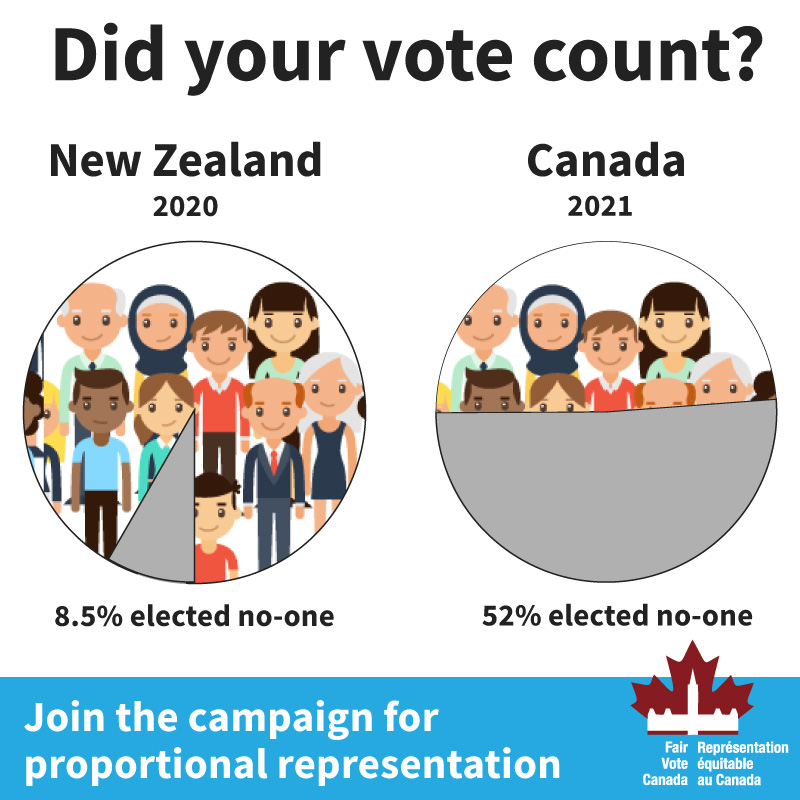
comments:To learn more: Canada fairvote.ca
youtube.com/@FairVoteCanadaUK makevotesmatter.org.uk
youtube.com/@MakeVotesMatterUSA fairvote.org
youtube.com/@fairvotereform- https://en.wikipedia.org/wiki/List_of_electoral_systems_by_country
- University of Waterloo professor, Byron Weber Becker, has published a set of computer simulations based upon historical voting statistics. These simulations indicate that
the Alternative Vote (AV) scheme
used in Australia is worse than first-past-the-post.
caveat: note that Alternative Vote is just first-past-the-post with ranked ballots. BTW, this scheme was used in Alberta approximately 100 years ago. - Andrew Coyne: The Way Forward on Electoral Reform in Canada and What’s Wrong With How We Vote?
- John Cleese (Monty Python) discusses FPTP problems in Britain
- History shows that costly errors are usually associated with majority wins because fewer people are
involved in decision making. Food-for-thought: British politicians of all parties agreed to quietly work together
under Churchill during WW2. Everything went well (politically speaking) until the end of the war when party bickering
resumed. If Britain had adopted proportional representation, then I suspect:
Britain would have applied to join the EU in 1952 rather than 1962 (entry was delayed until 1973 for reasons discussed here) Winston Churchill won a majority government in 1951 there would have been no Suez Canal crisis in 1956 Anthony Eden won a majority government in 1955 there would have been no Falklands War in 1982 Margaret Thatcher won a majority government in 1979 there would have been no BREXIT (starts in2016) David Cameron won conservative majorities (2010, 2015)
- More than 100 years ago, the majority of voters were barely educated, so they needed to send an educated representative to the nation's capital. Since the majority of today's voters are better educated, I wonder if sending a representative to the capital (where they fall under the influence of the party whip to vote the party line) is still necessary.
- Fifty years ago, when manufacturing was still a thing, the 'business class' usually voted conservative while the 'working middle class' usually voted labor. Since then, 'millionaires and billionaires' (a.k.a. the one percent) have hijacked conservative politics, then tricked the working class into supporting many right-wing causes which includes flat taxes, lower taxes, and austerity.
- About Cement and Concrete. Concrete is the world's most manufactured product, and
its environmental impact is similarly impressive — in particular, the large amount of carbon dioxide emitted during its
production. Today, there are many scientists working to reduce that impact. Canadian researcher Leah Ellis co-founded a
company that produces cement, which is one of the most energy-intensive parts of concrete, with electricity instead of
burning fossil fuels. University of California Davis professor Somayeh Nassiri is studying ways to mix other materials
with cement while reducing its carbon footprint – such as wood ash, volcanic ash, and ground-up
crustacean shells. In Canada, University of British Columbia researcher Shahria Alam is looking at a circular approach to
construction by making concrete with… more concrete, recycled from demolished structures.
https://www.cbc.ca/radio/quirks/quirks-quarks-oct-7-2023-1.6987989 (listen: 15 minutes)
quotes:
(1) According to last month's UN Environmental program report, the [concrete] equivalent of the entire city of Paris is added to the world, in new buildings, every week.
(2) The whole sector accounts for roughly 37% of global green house gas emissions. (a.k.a. CO2) - A few thoughts on Education. First off, you might wish to listen to this NPR podcast which explains how government-sponsored education transformed China from a very
backward country to a modern juggernaut
caveat: this history ends with Mao so does not contain any information from the second educational wave instituted by Deng Xiaoping which I personally witnessed in Boston more than 40 years ago while training as a computer engineer
comments: If you agree with me that an educated society is the primary factor in becoming/remaining relevant in the modern world, then:- why do western governments institute austerity programs to defund public education? (the father of economics, Adam Smith, advocated "government sponsored" education for all, including the working class who were unable to afford to educate themselves)
- why do western governments support sectarian (religious-based) education which includes home schooling?
- this is only desirable if you want to produce a society of priests and nuns.
- won't all sectarian students eventually become wards of the state? (look to modern day Israel to see and example of this)
- shouldn't religious education only be done on church property?
- What happened to the separation between church and state?
- why do western governments allow investors to make huge amounts of money on student loans, which only serve to temper higher levels of education? (perhaps "education" and "health care" should be run without capitalism's market-place incentives)
- Sal Khan of Khan Academy on 'How I Built This' (42-min) speaks about using A.I. to help teachers educate students. This is not a magic bullet for funding education since it requires all students to have access to an internet-connected computer. But it could provide the equivalent of a personalized tutor.
- Advanced Placement (many times just known as "AP") for providing opportunities to capable students.
- I have come to the conclusion that the economists running national banks have no
clue as to what they are doing.
First an aside: Last year as I drove my automobile out of a parking lot, I stepped on the brake pedal but nothing happened. I then applied much more force which achieved the desired result. Next, I slowly drove to a mechanic who informed me that while my front brakes were working, my back brakes were totally shot (rust had eaten though the hydraulic brake lines). Three cheers for dual brake systems!
Now back to the economics: Many national banks are trying to control of inflation by raising the prime lending rate (they hope that a small artificial recession will allow them to regain control of the economy). Unlike my automobile example, national banks have applied the metaphoric brake pedal numerous times but have not achieved the desired result, so they dither for a time, read their tea leaves, then try again. As of May-2023, American bankers have tried this ten times but none have asked the question: "what has changed to prevent this interest rate rise from working?" IMHO they are overlooking the obvious: "they think" there is only one meaningful money supply (theirs) but overlook the fact that huge pools of capital exist in corporations. Here are two: (1) Some North American automobile manufacturers are offering 1.5% interest rate loans (on the full Manufacture's Suggested Retail Price) which are more than 5% lower than a rate from a bank. (2) Many larger American companies (who pay little-to-no taxes because they see themselves as multi-nationals) are sitting on huge pools of off-shore capital which is moved in-and-out of the economy, irrespective of the prime lending rate. BTW, some of these companies have trillion dollar valuations making them bigger than most banana republics. Anyway, permit me to state the obvious: huge companies, not paying their taxes while sitting on a lot of offshore cash was almost unheard of thirty years ago. That was a time when the common citizen only used the word million.
My worry: In the book Capital in the Twenty First Century (a modern reinterpretation of Adam Smith) the author informs that the fundamental principle of capitalism is to provide 5% annual return on investment. This is always in the back of my mind whenever I hear that a bank intends to raise interest rates above 5% (USA, Britain, and Canada are already higher)
But what of the housing dilemma? High interest rates affect the whole economy which includes builders. I suspect very few construction projects (homes, apartments, condos) will be started when interest rates are high, and might go higher - This 1980 quote by author-educator Isaac Asimov (PhD Biochemistry) perfectly
describes modern life in North America where citizens become misinformed by accessing social media sites (Facebook,
Twitter, YouTube, TikTok, Snapchat) or politically biased news outlets (like Fox) run by publishing billionaires (like
Rupert Murdoch). The graphic reads:
"There is a cult of ignorance in the United States, and there always has been. The strain of anti-intellectualism has been a constant thread winding its way through our political and cultural life, nurtured by the false notion that democracy means that "my ignorance is just as good as your knowledge."
Isaac Asimov (Newsweek, 21 January 1980)
Another Asimov gem: "The saddest aspect of life right now is that science gathers knowledge faster than society gathers wisdom."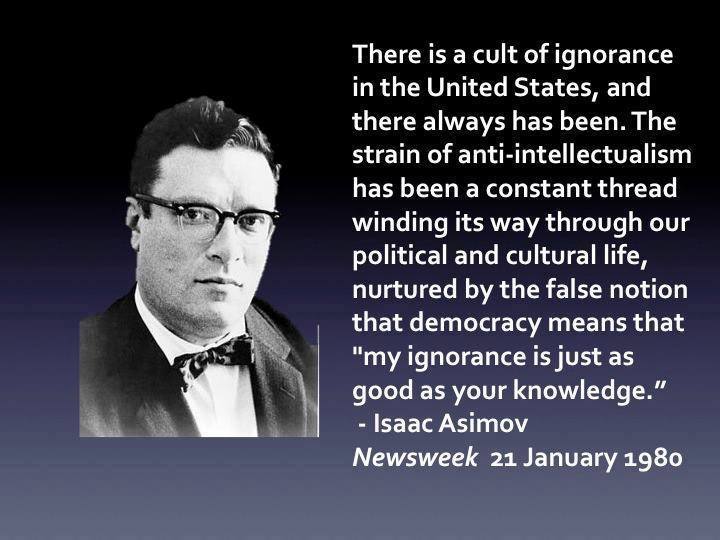
- From Anti-Government to Anti-Science: Why Conservatives Have Turned Against
Science.
article: https://direct.mit.edu/daed/article/151/4/98/113706/From-Anti-Government-to-Anti-Science-Why
abstract: In this essay, we argue that conservative hostility toward science is rooted in conservative hostility toward government regulation of the marketplace, which has morphed in recent decades into conservative hostility to government, tout court. This distrust was cultivated by conservative business leaders for nearly a century, but took strong hold during the Reagan administration, largely in response to scientific evidence of environmental crises that invited governmental response. Thus, science (particularly environmental and public health science) became the target of conservative anti-regulatory attitudes. We argue that contemporary distrust of science is mostly collateral damage, a spillover from carefully orchestrated distrust of government.
comments:- Podcast: Do Markets Need to be Regulated?
- Book: The Big Myth: How American Business Taught Us to Loathe Government and Love the Free Market
- Television: watch this interview with the author of the 2023 book Adam Smith's America
- I just learned the very disturbing history of the John
Birch Society (1958-1972) and how it sewed the seeds of many right-wing conspiracy theories. While I was
listening to this podcast (see 1+2 just below) I kept on thinking that this group just perpetuated the discredited
ideas of McCarthyism
(1) https://www.npr.org/2023/05/15/1176185306/how-a-secretive-extremist-group-radicalized-the-american-right
(2) https://www.npr.org/2023/05/17/1176662608/a-historian-details-how-a-secretive-extremist-group-radicalized-the-american-rig - Professor E.O.Wilson once said: Humans have Paleolithic Emotions, Medieval Institutions, and God-Like Technology. IMHO, this explains a lot
- Ignorance abounds in the era of social media where people offer opinions on
topics they know nothing about.
- woke became popular in US African American music community during the 1930s and means "alert to racial prejudice and discrimination". So today, anyone who is anti-woke could technically be guilty of "racial prejudice".
- critical race theory (CRT) is an academic critique of race theory (like eugenics, "race theory" is now considered pseudo science). Since "race theory" was used by the German NAZI party during the 1930s and 1940s to justify murder, then anyone who criticizes CRT could technically labelled a supporter of NAZI murder. Click here to learn more about this at NPR.
- lots of political types want to ban books and/or takeover control of libraries. They seem to have missed the lesson that " book bans" are always on the wrong side of history, and that banned titles are always more sought after. (psst: want to look at a banned book?)
- I still can't believe the number of people (many of them who identify as religious) who think that "sex" and "gender" mean the same thing. Sex (hardware of the body) is a label based upon physical observations at birth (not 100% accurate since 1-2% of babies are born with unambiguous or undifferentiated genitalia) or chromosomal tests. Gender is best thought of as software of the brain (which can develop differently from the body). I was totally unaware of this stuff until the release of this 1970 Hollywood movie, staring Raquel Welch, where she plays the role of a transsexual woman. Hugh Hefner shone light on this topic in a 1978 issue of Playboy Magazine. comment: Perhaps some of the current cultural confusion begins here because there is no such thing as transsexual since the post-op person would never be able to change their chromosomes -OR- reproduce via copulation. Anyway, medical professionals inform that only 1-2% of society is gay, and only 1% of that group seeks transgender surgery. This puts transgender statistics at 1 in 10,000 which seems to me to be a tiny number compared to the noise generated by politicians who are more interested in culture wars than traditional political issues like keeping people employed.
- Dog Whistle statements allow
bigots and racists to hide in plain site:
- Antisemites avoid the label by hurling their criticisms against George Soros.
- Homophobes avoid the label by hurling their criticisms against transgenders.
- Racists avoid the label by hurling their criticisms against CRT (critical race theory) or other proxies like Obama's citizenship, etc. (this latter item was a favorite of Donald Trump and many voters fell for it)
- Why I disconnected from social media (Twitter, Facebook, LinkedIn) starting
15-Jan-2023. The following text describes some of the contributing factors:
- https://www.cbc.ca/player/play/2000220228000
Technology took away our ability to focus, but Johann Hari says it's not too late to get it back. - https://www.cbc.ca/listen/live-radio/1-45-ontario-today/clip/15957007-why-hard-focus
- guests:
(1) Johann Hari, best-selling author of Stolen Focus: Why You Can't Pay Attention--and How to Think Deeply Again, explains why we are all having trouble paying attention and what we can do about it.
(2) Professor Nathan Spreng, Department of Neurology and Neurosurgery at McGill University, describes his research into the power of mind-wandering. - https://www.amazon.ca/Stolen-Focus-Attention-Think-Deeply/dp/0593138538/
- has any deep thought ever been transmitted in a twitter message of 140 or 280 characters?
- Companies with trillion dollar evaluations [Meta (Facebook + Instagram), Alphabet (Google + YouTube)] refuse to
financially support Canadian journalism so have removed all links to Canadian news. Will the USA be next? Welcome to a
dumber, more uninformed, future.
- https://en.wikipedia.org/wiki/Online News Act
- https://www.bbc.com/news/world-us-canada-66049640
- https://www.theguardian.com/us-news/2023/jun/01/california-news-publishers-law-meta-google
- https://www.aljazeera.com/news/2023/6/29/google-to-remove-news-from-search-in-canada-over-new-law
- https://www.theglobeandmail.com/politics/article-us-senator-urges-canada-to-stand-firm-against-meta-googles-threats-to/
- https://www.cbc.ca/player/play/2000220228000
- The Atlas of Impunity is the name of a publication which ranks countries by five dimensions of impunity: unaccountable governance, abuse of human rights, economic exploitation, conflict and violence, and environmental degradation. Visit the next link to learn more: https://www.eurasiagroup.net/live-post/atlas-of-impunity-2023
- Sea Level Rise is rising faster (one proof of global warming)
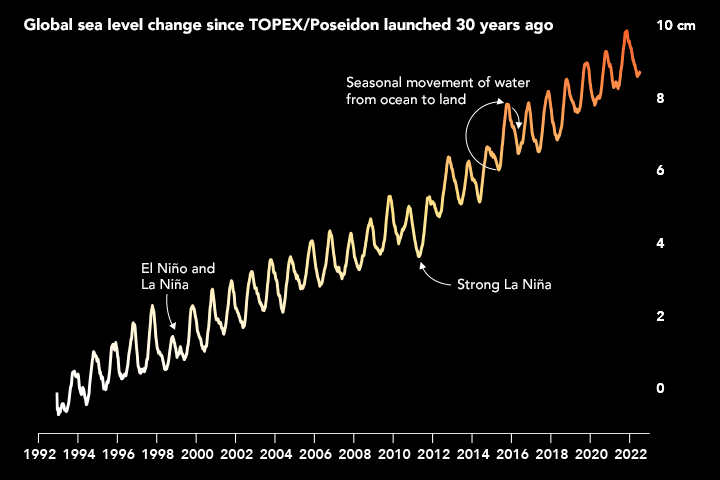
Global mean sea level has risen 101 millimeters (3.98 inches) since 1992 and continues to do so at 3.9 mm (0.15 inches) per year.
- https://en.wikipedia.org/wiki/Sea_level_rise
- https://earthobservatory.nasa.gov/collection/1684/sea-level-rise
- https://earthobservatory.nasa.gov/images/150192/tracking-30-years-of-sea-level-rise
- https://earthobservatory.nasa.gov/images/147572/sea-level-watcher-takes-flight
- nineteenth century average rate of rise: 1.4 mm per year.
- twentieth century average rate of rise: 1.7 mm per year.
- the current "satellite measured" rate of rise is: 3.9 mm per year.
- oops, in 2024 this number was increased to 4.62 mm/year)
- multiplying by 100 yields 390 mm (39 cm or 15 inches) per century.
- recall that distance over time is known as velocity (or speed); and that an increase in velocity over time is known as acceleration. Since the rate of sea level rise (speed) is increasing then we can say that sea level rise is accelerating (much worse than simply increasing)
- this measurement is vertical, but beaches are sloped which means much more flooding during high tides and storm surges.
- 39 cm (15 inches) per century is a guaranteed minimum BUT it appears that the annual rate has now passed 4.0 mm per year.
- Sea-level rise(continued):
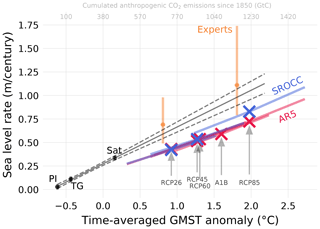 While it is difficult to measure Earth's daily average temperature (consider: day-night cycles; seasonal changes) then do
annual trend analysis (consider: daily weather events; decadal weather events like El Niño and La Niña), it is
much easier to measure the effects of warming as seen in sea-level rise. Most climate-change skeptics stand down after
viewing data showing average annual sea level
rate-of-rise more than doubling from 1.7 mm per year to 3.9 mm per year in
just one century (much of the original data came from military sources)
While it is difficult to measure Earth's daily average temperature (consider: day-night cycles; seasonal changes) then do
annual trend analysis (consider: daily weather events; decadal weather events like El Niño and La Niña), it is
much easier to measure the effects of warming as seen in sea-level rise. Most climate-change skeptics stand down after
viewing data showing average annual sea level
rate-of-rise more than doubling from 1.7 mm per year to 3.9 mm per year in
just one century (much of the original data came from military sources)
additionally: The content of this scientific paper from Denmark ( https://os.copernicus.org/articles/17/181/2021/ ) is much more troubling. The first line of the abstract reads: "Recent assessments from the Intergovernmental Panel on Climate Change (IPCC) imply that global mean sea level is unlikely to rise more than about 1.1 meters within this century but will increase further beyond 2100". This statement infers that a rise of one meter (39 inches) by the end of this century is within the scope of possibility. Then from this IPCC 2021 summary we read one very troubling line: "Sea-level rise by 2100 is likely to be from half to one meter, but two to five meters is not ruled out, as ice sheet instability processes are still poorly understood."
1964 quote from gateio: “We live in an age of rising seas. In our own lifetime we are witnessing a startling alteration of climate.”
- POLIDIOT (political idiot) is a label applicable to both citizens and politicians
who insist their "political opinion" is superior to "empirical fact" (this includes politicians who advocate for
cryptocurrenices). To those people I present this quote from 1936:
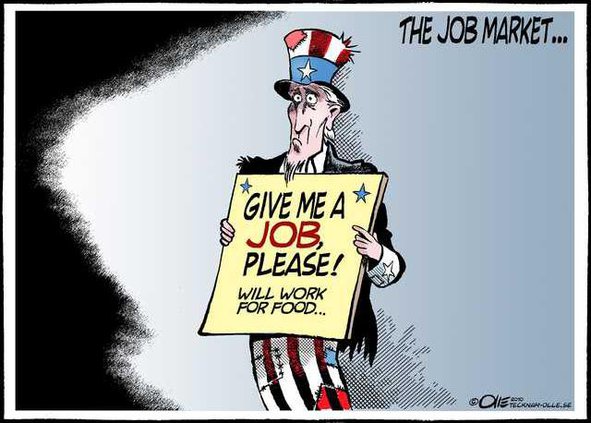
"The ideas of economists and political philosophers, both when they are right and when they are wrong, are more powerful than is commonly understood. Indeed, the world is ruled by little else. Practical men, who believe themselves to be quite exempt from any intellectual influence, are usually the slaves of some defunct economist. Madmen in authority, who hear voices in the air, are distilling their frenzy from some academic scribbler of a few years back. There are not many who are influenced by new theories after they are twenty-five or thirty years of age, so that the ideas which civil servants and politicians and even agitators apply to current events are not likely to be the newest."
comment: no one "likes" the idea of printing up money, but you would not like the alternative. Recall that very little was done after the crash of 1929; this resulted in a decade of hobos (homeless men looking for work), soup kitchens, and people wearing signs reading "will work for food" - Two decades of misinformation and COVID-19
 Misinformation
1: The Republican-dominated US Congress of 1987 eliminated the FCC Fairness Doctrine citing a violation of the right to free-speech by corporations (did the
framers of the constitution ever intend corporations to have the same rights as people?) This enabled politically biased
outlets, like Fox News (Cable TV) and Rush Limbaugh (Syndicated Radio), to play fast and loose with the truth. Americans
today seem unaware of the fact that one-sided political propaganda in Germany triggered world-war-2
Misinformation
1: The Republican-dominated US Congress of 1987 eliminated the FCC Fairness Doctrine citing a violation of the right to free-speech by corporations (did the
framers of the constitution ever intend corporations to have the same rights as people?) This enabled politically biased
outlets, like Fox News (Cable TV) and Rush Limbaugh (Syndicated Radio), to play fast and loose with the truth. Americans
today seem unaware of the fact that one-sided political propaganda in Germany triggered world-war-2
Misinformation 2: Since the rise of the world-wide-web (1991) and mobile social media (2007) society has witnessed an ever increasing amount of bad science from non-experts on both sides of the political spectrum (vaccine hesitancy is one example). As advertising revenue moved online, many print publishers went out of business which triggered societal problems. Recall that newspapers could be sued under libel laws for publishing misinformation, so they employed editors and journalists to provide "best effort reporting" of "best-effort fact-checked information". Internet media sites are protected from lawsuits under Section 230 of the Communications Decency Act (created in 1996 to help start internet businesses) so they check nothing which allows them to cut costs by eliminating jobs (even though they are incredibly rich and pay virtually zero taxes)
Comments: Herbert Spencer published Principles of Biology in 1864 which is the first book containing the phrase Survival of the Fittest. We now live in the age of Survival of the Smartest which requires every citizen to be able to separate "fact from fiction", or "fact from political opinion", or "fact from religious dogma". Since many people are unable or unwilling to do this, then many are going to die prematurely. Thinking they are "politically right" will result is many becoming "dead wrong". Now click COVID-19 deaths by country then click top-of-the column "Deaths/1 million" to reorder the table by that metric. Why did the USA (rank=15) do so badly compared with their neighbors Mexico (39) and Canada (82)? Could this have anything to do with the fact that a modern interpretation of the American first amendment right to free speech, as it applies to billionaire big tech companies (Twitter, Facebook, Threads, YouTube, etc.) protects the dissemination of misinformation? - Half of us are as dumb as rocks
I enjoy listening to the CBC radio program / podcast Under The Influence which tells past stories from advertising industry. Episode S10E14 compares the marketing success of the McDonald's Quarter Pounder with the marketing failure of the A&W Third of a Pounder. During post-failure analysis, marketers discovered that more than half the people in the focus groups were confused about which was the better deal. Consumers genuinely thought McDonald's was the better deal because they believed that a quarter pound was more than a third of a pound because 4 is larger than 3.
comment: makes we wonder how much of our Neanderthal DNA is active. Please think about this the next time you decided to pontificate on subjects like politics, the economy and vaccines. - China in the news
This video shows China moving forward on many Chinese infrastructure projects while we watch vested interests in the North American fossil-fuel industry doing their best to maintain the status quo.
comments: this video was created by Bloomberg and is titled Why China’s Lead on EVs Has Been a Long Time Coming. Even if you disagree with the title, this video shows that a significant change is already taking place in the world's most populated country. China is no longer a country of bicycle riders. I am sometimes shocked when I see modern video from places like Japan, South Korea or China where their societies seem to be moving in the direction of The Jetsons while everything in the North America seems to be decaying.
2024-update: why-you-cant-buy-a-cheap-chinese-electric-car (CBC Podcast)
- Commenting on Huawei: It appears to me that western society only supports capitalism
"when the west wins". When a Chinese company, like Huawei,
becomes the next Nortel, then ridiculous conspiracy theories are invoked. Huawei was one of many companies that bid on the
sale of Nortel's
intellectual property, as did Apple, Microsoft, Sony, RIM (Blackberry), Google and others. Huawei was not one of the
winners which forced it to increase its own R&D operations (estimates put Huawei R&D in 2019 at a massive 40% of
net income) so it should come at no surprise that Huawei is 18-24 months ahead of their competition in the field of 5G
wireless. Simple logic shows that Huawei could only achieve parity if they were stealing I/P. Did I mention that their 5G
hardware is 90% less expensive than anything from their competition?
food-for-thought: according to the 2022 book Chip War, Huawei employed 100 IBM consultants for more than a decade with the intent that "Huawei could operate with IBM efficiency"
Deng Xiaoping (pronounced "dung chow ping") once said "The Middle East has its oil, China has rare earth". Since modern electronics is dependent upon rare-earth materials then it should be no surprise that Chinese-made electronics is much less expensive. Speaking of Deng for a moment, in 1985 I was attending school in Boston where it appeared to me that Chinese students were everywhere. Apparently, Deng had sent 1.3 million Chinese students out into the world to receive a top-quality western education paid for by China (one of my more-gifted Chinese classmates was accompanied by "two minders" who were there to ensure that he returned to China). Unlike Mao, Deng saw great value in education and realized that this was the best way forward for China. Thirty-five years later, China has moved more than 350 million Chinese citizens from poverty into the middle class. This number is greater than the total population of the USA so is it any surprise that China is doing well? Meanwhile, there is a tendency amongst some westerners to label "an educated person" as "an elite". It seems to me that the world has flipped. - Our culture is awash in lies, dominated by streams of never-ending electronic hallucinations that merge fact and fiction until they are indistinguishable. We have become the most illusioned society on earth. Politics is a species of endless and meaningless political theater. Politicians have morphed into celebrities. Our two ruling parties are, in reality, one party - the corporate party. And those who attempt to puncture this vast, breathless universe of fake news, designed to push through the cruelty and exploitation of the neoliberal order, are pushed so far to the margins of society, including by a public broadcasting system that has sold its soul for corporate money, that we might as well be mice squeaking against an avalanche, but squeak we MUST
-
A conservative friend of mine was fond of asking me political questions (I am a centrist) then would cut me off mid-sentence before I finished answering. Apparently, he was the only conservative among his family of brothers, sisters and parents but had no problem thinking he was right (er, correct) while they were wrong. How could this be? This thought rattled around in my mind until I stumbled across a book titled The Republican Brain which was positively reviewed by liberals and conservatives alike. The book contains several points which I will pass along here:
- Size differences in two brain structures, the amygdala (larger in conservatives) and the anterior cingulate (larger in liberals), bias human perspective of the world.
- Conservatives see most issues as "black-and-white" (or good-and-evil) and are more pessimistic while liberals see "shades of gray" and are generally more optimistic.
- Conservatives are more fearful of others so are more easily encouraged to vote for POPULIST issues like "building the wall" or BREXIT (funny point: Britain had the lowest number of per-capita immigrants but had the highest political reaction against them)
- Conservatives play politics as a team sport so will almost always "vote their party" while Liberals will split their vote choosing alternate parties (not very smart in first-past-the -post)
- When I was a student, I read an English translation of The Road to Serfdom by Friedrich Hayek. Then I later heard Margret Thatcher using the book to bash socialism, I wondered if she was reading a different translation (Hayek only published in German) since her quotes bore little resemblance to Hayek's book (was Thatcher paraphrasing?). Anyway, when Hayek slams socialism, he is referring to state-sponsored collectivism which is not the same thing as practiced (in one form or another) by most countries of the world except the USA. I recently stumbled onto this Hayek article titled Why I am Not a Conservative (excerpted from a 1960 book titled The Constitution of Liberty - I wonder if Thatcher knew about this).
- When I attended college in the early 1970s, many students seemed to be talking
about Ayn Rand or quoting from her magnum opus Atlas Shrugged. Years later I finally got around to reading the book which left me with these
thoughts:
- Like George Orwell (1984) Ayn Rand knows how to tell a fictional dystopian story
- Rand's character John Galt seems to be a kinder (although equally ridiculous) version of Orwell's character Big Brother
- 1984 (which Orwell claimed is really about 1948 England) was published in 1949 while Atlas Shrugged was published in 1957 so perhaps this tells us something about the zeitgeist of those years
- Ayn Rand seemed to project a naive (childish?) view of industry vs government regulation. Did she really think that corporations would never do anything evil? Had she lived longer I would have loved to hear her ATTEMPT to defend the actions of the Big Tobacco for knowing the numerous health hazards associated with the use of their product then hiding them in order to make a buck; or that EXXON knew as early as 1977 that the burning of fossil fuels would cause climate change (they hid these reports then hired retired scientists working for politically motivated think thanks to deny such a thing was possible). It is possible that these large companies got the inspiration to do this from Rand's description of the fictional "State Science Institute" which was low on science while high on politics. I wonder if people who read this book are also skeptical of science and vaccines.
Jan-2023: I just heard this pod-cast about Ayn Rand on NPR: https://www.npr.org/2022/12/22/1145107911/the-monster-of-we-2021
comment: People who see the world through the prism of politics (or see the world in black + white) will love this. People who see the world in shades of gray may not.
A mysterious monolith awakens the imagination of humanity's distant ancestors. A second monolith awaits humanity's giant leap to the moon. And in orbit around Jupiter, a third monolith beckons humanity to transcend beyond the limits of body and machine.
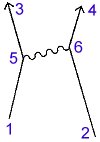
This Feynman Diagram describing "electron repulsion" depicts the movement of two electrons (1-to-3 and 2-to-4) in space and time. A virtual photon transfers energy between them (5-to-6) causing them to repel each other. To learn more:
1) brief explanation
2) detailed explanation
Legend: Y-Axis (up-down) is time while X-Axis (left-right) is space

Neil Rieck
Waterloo, Ontario, Canada
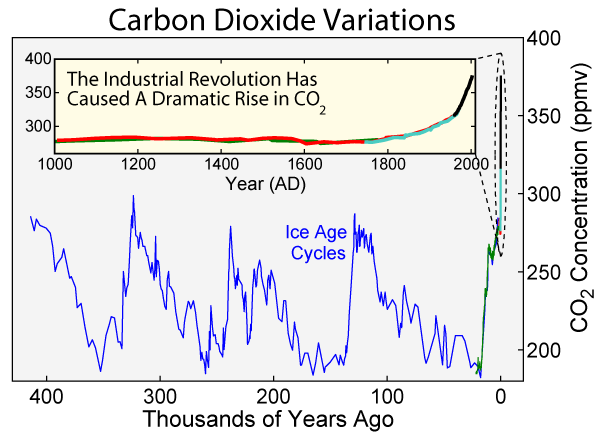
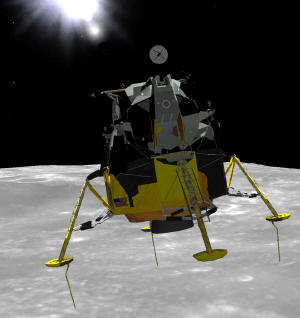 Eagle Lander
Eagle Lander
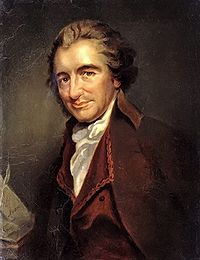 Thomas Paine
Thomas Paine
